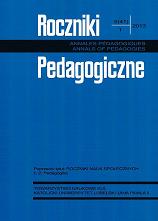Krytyczna rola filozofii w ukazywaniu selektywnego kształcenia i wychowania młodzieży na przykładzie fenomenologii Dietricha von Hildebranda
A Critical Role of a Philosophy in the Presentation of a Selective Education and Youth Upbringing onthe Basis ofthe Phenomenology of D. von Hildebrand
Author(s): Anna LendzionSubject(s): Education
Published by: Towarzystwo Naukowe KUL & Katolicki Uniwersytet Lubelski Jana Pawła II
Keywords: emotions; values; reason; will; uczucia; wartości; rozum; wola
Summary/Abstract: The following article includes an analysis of human emotions concept, according to The Phenomenology of Dietrich von Hildebrand. This phenomenology is an example of an explanatory and critical role of the philosophy in an evaluation of upbringing and educational attitudes. A neglect of inward feelings leads to the selective formation of a person in the educational and upbringing process, based on the reductionist concept of man. A rehabilitation of human emotions is connected with an appreciation of higher feelings in upbringing, in which an enculturation, socialization and personalization are considered complementary. The three basic forms of contribution in values (i.e.: values embodiment, unification and creation) also have a significant meaning in upbringing. An analytic and pragmatic reason overgrowth and will overestimation lead to an emotional reduction. A “humble, righteous and loving I” is the source of the feelings which are adequate to cognised values. Issues of the human emotions complexity, an attitude towards values, an inharmonious development of human cognitive, aspiring and emotional spheres as well as the personal “I” are analysed in the phenomenological approach that emphasises an intentionality in human – world relations, an objective character of the values existing in a non-subjective world and essential dimension of the experience of a person.
Journal: Roczniki Pedagogiczne
- Issue Year: 5/2013
- Issue No: 1
- Page Range: 25-39
- Page Count: 15
- Language: Polish

